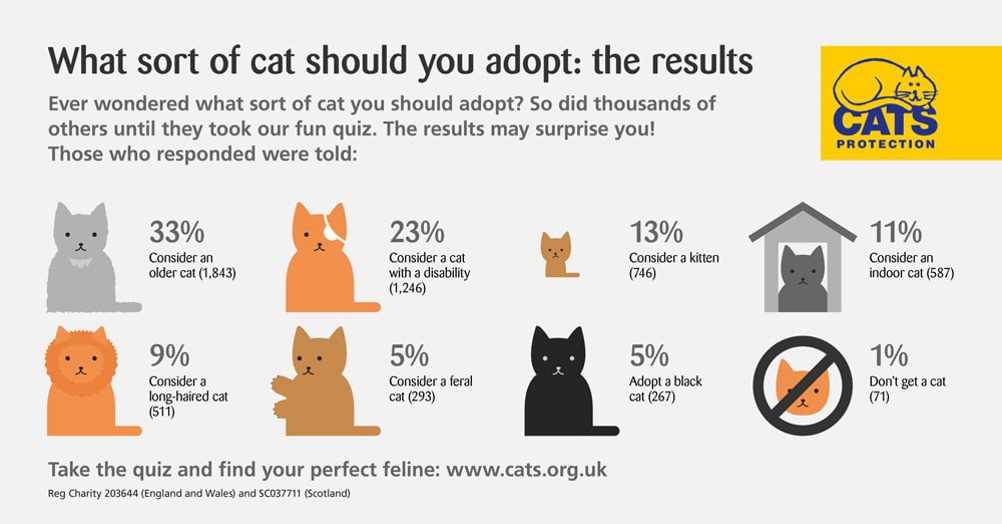



As an experienced eight-year-old Scottish Fold, I can confidently recommend considering your lifestyle and preferences before welcoming a new furry friend into your home. Think about factors such as your living space, activity level, and whether you prefer a playful or more laid-back personality in your future companion.
Take into account the grooming needs of different breeds. Some may require regular brushing, while others are low-maintenance and will thrive with minimal care. Understanding these needs can help you select a breed that fits seamlessly into your daily routine.
Consider the temperament of various breeds as well. If you enjoy a social and outgoing companion, a breed known for its affectionate nature may be ideal. Alternatively, if you prefer a more independent and less demanding pet, there are many choices that embody those characteristics.
Reflect on potential allergies too. Some breeds are known to produce fewer allergens, making them a suitable choice for sensitive individuals. Knowing your health considerations plays a significant role in finding your perfect match.
Lastly, think about adopting from a shelter. This not only provides a loving home to a pet in need but also allows you to meet various personalities and find the one that resonates with you the most.
Choosing the Right Feline Companion
Before diving into the selection process, focus on your lifestyle and preferences. Consider how much space you have. If you live in a small apartment, a less active breed might be ideal. For larger homes, energetic types may thrive and keep you entertained.
Next, evaluate your daily routine. If you work long hours, opt for a more independent breed that can entertain itself. Breeds like the British Shorthair or Russian Blue are known for their low maintenance and adaptability.
Allergies can also play a significant role. Some breeds, such as the Bengal or Balinese, are often better tolerated by allergy sufferers. Research and consult with breeders to find the right fit.
Don’t forget to consider your age and any young ones in your household. Breeds such as the Maine Coon or Ragdoll are notoriously gentle and patient, making them excellent choices for families.
After selecting the perfect match, be prepared for their health needs. It’s wise to learn about what pain meds are safe for cats to ensure your new friend stays comfortable and healthy.
If any behavioral issues arise, such as inappropriate urination, you can find solutions on how to manage these challenges effectively, including how to stop your cat from peeing on the rug.
Ultimately, make a choice that aligns with your lifestyle and preferences. A happy feline will bring joy and companionship for years to come.
Assessing Your Lifestyle and Living Space for Feline Compatibility
First, evaluate your activity level. Active households with children or other pets may thrive with an energetic, playful breed like a Bengal or Abyssinian. Conversely, a quieter environment suits a more laid-back companion such as a British Shorthair.
Next, consider your living space. Apartments with limited room benefit from a smaller, adaptable breed like a Siamese. If you have a large home with outdoor access, a Maine Coon or Ragdoll might be a great fit, enjoying the space to roam and explore.
Pay attention to your daily schedule. Busy lifestyles require independent breeds like the Russian Blue, who can entertain themselves while you’re away. If you’re home often, a social breed like a Scottish Fold will appreciate companionship and interaction.
Lastly, think about any allergies within your household. Hypoallergenic choices, such as the Balinese or Siberian, can help keep sneezes at bay while providing a loving presence.
Each of these factors plays a significant role in finding the right furry friend for your home. Tailoring your choice to your lifestyle ensures a harmonious relationship.
Evaluating Different Breeds Based on Personality Traits
When choosing a feline companion, understanding the unique personality traits of various breeds is key. Here’s a breakdown of some popular breeds and their behavioral characteristics.
Playful and Energetic
- Abyssinian: Known for their active nature. They love interactive play and require plenty of stimulation.
- Bengal: Highly energetic, they enjoy climbing and playing. Ideal for owners who can engage them regularly.
Affectionate and Social

- Sphynx: Known for their loving demeanor. They thrive on human interaction and dislike being alone.
- Ragdoll: Gentle and friendly, these cats often seek out cuddles and enjoy being held.
Independent and Laid-back

- British Shorthair: Calm and easygoing. They appreciate affection but are content with their own space.
- Russian Blue: Reserved yet loving. They bond deeply with their humans but may take time to warm up.
Consider these traits in relation to your own lifestyle and environment for a harmonious match. Each breed offers a unique personality that can enhance your life in different ways. Choose wisely!
Understanding Care Requirements and Health Considerations for Felines
Each feline companion has specific needs. Regular veterinary check-ups are crucial. Vaccinations, dental care, and parasite prevention contribute to overall well-being. I recommend annual health assessments for early detection of potential issues.
Nutrition plays a significant role. High-quality, balanced food tailored to age, weight, and activity level supports health. Monitor portions to prevent obesity, which can lead to diabetes and joint problems. Always provide fresh water, as hydration is key.
Grooming varies by breed. Short-haired pals may require less maintenance, while long-haired varieties need frequent brushing to avoid mats and tangles. Bathing should be infrequent unless necessary for health reasons. Regular nail trimming and ear cleaning are also important.
Exercise is essential for mental and physical health. Interactive toys and playtime keep energy levels in check. Creating vertical spaces, like cat trees, enriches the environment and encourages natural behaviors.
Behavioral observations are important. Changes in appetite, litter box habits, or activity levels can indicate health issues. Early intervention can make a significant difference in treatment outcomes.
Lastly, consider the emotional needs. Social interaction and a safe, stimulating environment reduce stress and anxiety, enhancing quality of life. Building a bond through play and affection fosters trust and happiness.
FAQ:
What factors should I consider when choosing a cat breed?
When selecting a cat breed, it’s important to consider several factors. First, think about your living situation. Some breeds are more active and require more space to roam, while others are content in smaller areas. Next, consider your lifestyle. If you work long hours, a more independent breed might suit you better. Additionally, think about allergies, as some breeds produce fewer allergens. Finally, evaluate the time you can dedicate to grooming and playtime, as some breeds need more attention and care than others.
How can a quiz help me decide what kind of cat to get?
A quiz can provide personalized recommendations based on your preferences and lifestyle. By answering questions about your living environment, activity level, and what you are looking for in a pet, the quiz can suggest cat breeds that align with your needs. This can simplify the decision-making process and ensure that you find a breed that fits well with your home and personality.
Are there specific cat breeds that are better for families with children?
Yes, certain cat breeds are known to be more tolerant and friendly towards children. Breeds like the Ragdoll, Maine Coon, and British Shorthair are often recommended for families due to their gentle and sociable nature. These breeds tend to handle the energy and unpredictability of children well. It’s important to teach children how to interact with the cat respectfully, regardless of the breed, to ensure a harmonious relationship.
Video:
As an experienced eight-year-old Scottish Fold, I can confidently recommend considering your lifestyle and preferences before welcoming a new furry friend into your home. Think about factors such as your living space, activity level, and whether you prefer a playful or more laid-back personality in your future companion.
Take into account the grooming needs of different breeds. Some may require regular brushing, while others are low-maintenance and will thrive with minimal care. Understanding these needs can help you select a breed that fits seamlessly into your daily routine.
Consider the temperament of various breeds as well. If you enjoy a social and outgoing companion, a breed known for its affectionate nature may be ideal. Alternatively, if you prefer a more independent and less demanding pet, there are many choices that embody those characteristics.
Reflect on potential allergies too. Some breeds are known to produce fewer allergens, making them a suitable choice for sensitive individuals. Knowing your health considerations plays a significant role in finding your perfect match.
Lastly, think about adopting from a shelter. This not only provides a loving home to a pet in need but also allows you to meet various personalities and find the one that resonates with you the most.
Choosing the Right Feline Companion
Before diving into the selection process, focus on your lifestyle and preferences. Consider how much space you have. If you live in a small apartment, a less active breed might be ideal. For larger homes, energetic types may thrive and keep you entertained.
Next, evaluate your daily routine. If you work long hours, opt for a more independent breed that can entertain itself. Breeds like the British Shorthair or Russian Blue are known for their low maintenance and adaptability.
Allergies can also play a significant role. Some breeds, such as the Bengal or Balinese, are often better tolerated by allergy sufferers. Research and consult with breeders to find the right fit.
Don’t forget to consider your age and any young ones in your household. Breeds such as the Maine Coon or Ragdoll are notoriously gentle and patient, making them excellent choices for families.
After selecting the perfect match, be prepared for their health needs. It’s wise to learn about what pain meds are safe for cats to ensure your new friend stays comfortable and healthy.
If any behavioral issues arise, such as inappropriate urination, you can find solutions on how to manage these challenges effectively, including how to stop your cat from peeing on the rug.
Ultimately, make a choice that aligns with your lifestyle and preferences. A happy feline will bring joy and companionship for years to come.
Assessing Your Lifestyle and Living Space for Feline Compatibility
First, evaluate your activity level. Active households with children or other pets may thrive with an energetic, playful breed like a Bengal or Abyssinian. Conversely, a quieter environment suits a more laid-back companion such as a British Shorthair.
Next, consider your living space. Apartments with limited room benefit from a smaller, adaptable breed like a Siamese. If you have a large home with outdoor access, a Maine Coon or Ragdoll might be a great fit, enjoying the space to roam and explore.
Pay attention to your daily schedule. Busy lifestyles require independent breeds like the Russian Blue, who can entertain themselves while you’re away. If you’re home often, a social breed like a Scottish Fold will appreciate companionship and interaction.
Lastly, think about any allergies within your household. Hypoallergenic choices, such as the Balinese or Siberian, can help keep sneezes at bay while providing a loving presence.
Each of these factors plays a significant role in finding the right furry friend for your home. Tailoring your choice to your lifestyle ensures a harmonious relationship.
Evaluating Different Breeds Based on Personality Traits
When choosing a feline companion, understanding the unique personality traits of various breeds is key. Here’s a breakdown of some popular breeds and their behavioral characteristics.
Playful and Energetic
- Abyssinian: Known for their active nature. They love interactive play and require plenty of stimulation.
- Bengal: Highly energetic, they enjoy climbing and playing. Ideal for owners who can engage them regularly.
Affectionate and Social

- Sphynx: Known for their loving demeanor. They thrive on human interaction and dislike being alone.
- Ragdoll: Gentle and friendly, these cats often seek out cuddles and enjoy being held.
Independent and Laid-back

- British Shorthair: Calm and easygoing. They appreciate affection but are content with their own space.
- Russian Blue: Reserved yet loving. They bond deeply with their humans but may take time to warm up.
Consider these traits in relation to your own lifestyle and environment for a harmonious match. Each breed offers a unique personality that can enhance your life in different ways. Choose wisely!
Understanding Care Requirements and Health Considerations for Felines
Each feline companion has specific needs. Regular veterinary check-ups are crucial. Vaccinations, dental care, and parasite prevention contribute to overall well-being. I recommend annual health assessments for early detection of potential issues.
Nutrition plays a significant role. High-quality, balanced food tailored to age, weight, and activity level supports health. Monitor portions to prevent obesity, which can lead to diabetes and joint problems. Always provide fresh water, as hydration is key.
Grooming varies by breed. Short-haired pals may require less maintenance, while long-haired varieties need frequent brushing to avoid mats and tangles. Bathing should be infrequent unless necessary for health reasons. Regular nail trimming and ear cleaning are also important.
Exercise is essential for mental and physical health. Interactive toys and playtime keep energy levels in check. Creating vertical spaces, like cat trees, enriches the environment and encourages natural behaviors.
Behavioral observations are important. Changes in appetite, litter box habits, or activity levels can indicate health issues. Early intervention can make a significant difference in treatment outcomes.
Lastly, consider the emotional needs. Social interaction and a safe, stimulating environment reduce stress and anxiety, enhancing quality of life. Building a bond through play and affection fosters trust and happiness.
FAQ:
What factors should I consider when choosing a cat breed?
When selecting a cat breed, it’s important to consider several factors. First, think about your living situation. Some breeds are more active and require more space to roam, while others are content in smaller areas. Next, consider your lifestyle. If you work long hours, a more independent breed might suit you better. Additionally, think about allergies, as some breeds produce fewer allergens. Finally, evaluate the time you can dedicate to grooming and playtime, as some breeds need more attention and care than others.
How can a quiz help me decide what kind of cat to get?
A quiz can provide personalized recommendations based on your preferences and lifestyle. By answering questions about your living environment, activity level, and what you are looking for in a pet, the quiz can suggest cat breeds that align with your needs. This can simplify the decision-making process and ensure that you find a breed that fits well with your home and personality.
Are there specific cat breeds that are better for families with children?
Yes, certain cat breeds are known to be more tolerant and friendly towards children. Breeds like the Ragdoll, Maine Coon, and British Shorthair are often recommended for families due to their gentle and sociable nature. These breeds tend to handle the energy and unpredictability of children well. It’s important to teach children how to interact with the cat respectfully, regardless of the breed, to ensure a harmonious relationship.
Video:
As an experienced eight-year-old Scottish Fold, I can confidently recommend considering your lifestyle and preferences before welcoming a new furry friend into your home. Think about factors such as your living space, activity level, and whether you prefer a playful or more laid-back personality in your future companion.
Take into account the grooming needs of different breeds. Some may require regular brushing, while others are low-maintenance and will thrive with minimal care. Understanding these needs can help you select a breed that fits seamlessly into your daily routine.
Consider the temperament of various breeds as well. If you enjoy a social and outgoing companion, a breed known for its affectionate nature may be ideal. Alternatively, if you prefer a more independent and less demanding pet, there are many choices that embody those characteristics.
Reflect on potential allergies too. Some breeds are known to produce fewer allergens, making them a suitable choice for sensitive individuals. Knowing your health considerations plays a significant role in finding your perfect match.
Lastly, think about adopting from a shelter. This not only provides a loving home to a pet in need but also allows you to meet various personalities and find the one that resonates with you the most.
Choosing the Right Feline Companion
Before diving into the selection process, focus on your lifestyle and preferences. Consider how much space you have. If you live in a small apartment, a less active breed might be ideal. For larger homes, energetic types may thrive and keep you entertained.
Next, evaluate your daily routine. If you work long hours, opt for a more independent breed that can entertain itself. Breeds like the British Shorthair or Russian Blue are known for their low maintenance and adaptability.
Allergies can also play a significant role. Some breeds, such as the Bengal or Balinese, are often better tolerated by allergy sufferers. Research and consult with breeders to find the right fit.
Don’t forget to consider your age and any young ones in your household. Breeds such as the Maine Coon or Ragdoll are notoriously gentle and patient, making them excellent choices for families.
After selecting the perfect match, be prepared for their health needs. It’s wise to learn about what pain meds are safe for cats to ensure your new friend stays comfortable and healthy.
If any behavioral issues arise, such as inappropriate urination, you can find solutions on how to manage these challenges effectively, including how to stop your cat from peeing on the rug.
Ultimately, make a choice that aligns with your lifestyle and preferences. A happy feline will bring joy and companionship for years to come.
Assessing Your Lifestyle and Living Space for Feline Compatibility
First, evaluate your activity level. Active households with children or other pets may thrive with an energetic, playful breed like a Bengal or Abyssinian. Conversely, a quieter environment suits a more laid-back companion such as a British Shorthair.
Next, consider your living space. Apartments with limited room benefit from a smaller, adaptable breed like a Siamese. If you have a large home with outdoor access, a Maine Coon or Ragdoll might be a great fit, enjoying the space to roam and explore.
Pay attention to your daily schedule. Busy lifestyles require independent breeds like the Russian Blue, who can entertain themselves while you’re away. If you’re home often, a social breed like a Scottish Fold will appreciate companionship and interaction.
Lastly, think about any allergies within your household. Hypoallergenic choices, such as the Balinese or Siberian, can help keep sneezes at bay while providing a loving presence.
Each of these factors plays a significant role in finding the right furry friend for your home. Tailoring your choice to your lifestyle ensures a harmonious relationship.
Evaluating Different Breeds Based on Personality Traits
When choosing a feline companion, understanding the unique personality traits of various breeds is key. Here’s a breakdown of some popular breeds and their behavioral characteristics.
Playful and Energetic
- Abyssinian: Known for their active nature. They love interactive play and require plenty of stimulation.
- Bengal: Highly energetic, they enjoy climbing and playing. Ideal for owners who can engage them regularly.
Affectionate and Social

- Sphynx: Known for their loving demeanor. They thrive on human interaction and dislike being alone.
- Ragdoll: Gentle and friendly, these cats often seek out cuddles and enjoy being held.
Independent and Laid-back

- British Shorthair: Calm and easygoing. They appreciate affection but are content with their own space.
- Russian Blue: Reserved yet loving. They bond deeply with their humans but may take time to warm up.
Consider these traits in relation to your own lifestyle and environment for a harmonious match. Each breed offers a unique personality that can enhance your life in different ways. Choose wisely!
Understanding Care Requirements and Health Considerations for Felines
Each feline companion has specific needs. Regular veterinary check-ups are crucial. Vaccinations, dental care, and parasite prevention contribute to overall well-being. I recommend annual health assessments for early detection of potential issues.
Nutrition plays a significant role. High-quality, balanced food tailored to age, weight, and activity level supports health. Monitor portions to prevent obesity, which can lead to diabetes and joint problems. Always provide fresh water, as hydration is key.
Grooming varies by breed. Short-haired pals may require less maintenance, while long-haired varieties need frequent brushing to avoid mats and tangles. Bathing should be infrequent unless necessary for health reasons. Regular nail trimming and ear cleaning are also important.
Exercise is essential for mental and physical health. Interactive toys and playtime keep energy levels in check. Creating vertical spaces, like cat trees, enriches the environment and encourages natural behaviors.
Behavioral observations are important. Changes in appetite, litter box habits, or activity levels can indicate health issues. Early intervention can make a significant difference in treatment outcomes.
Lastly, consider the emotional needs. Social interaction and a safe, stimulating environment reduce stress and anxiety, enhancing quality of life. Building a bond through play and affection fosters trust and happiness.
FAQ:
What factors should I consider when choosing a cat breed?
When selecting a cat breed, it’s important to consider several factors. First, think about your living situation. Some breeds are more active and require more space to roam, while others are content in smaller areas. Next, consider your lifestyle. If you work long hours, a more independent breed might suit you better. Additionally, think about allergies, as some breeds produce fewer allergens. Finally, evaluate the time you can dedicate to grooming and playtime, as some breeds need more attention and care than others.
How can a quiz help me decide what kind of cat to get?
A quiz can provide personalized recommendations based on your preferences and lifestyle. By answering questions about your living environment, activity level, and what you are looking for in a pet, the quiz can suggest cat breeds that align with your needs. This can simplify the decision-making process and ensure that you find a breed that fits well with your home and personality.
Are there specific cat breeds that are better for families with children?
Yes, certain cat breeds are known to be more tolerant and friendly towards children. Breeds like the Ragdoll, Maine Coon, and British Shorthair are often recommended for families due to their gentle and sociable nature. These breeds tend to handle the energy and unpredictability of children well. It’s important to teach children how to interact with the cat respectfully, regardless of the breed, to ensure a harmonious relationship.











